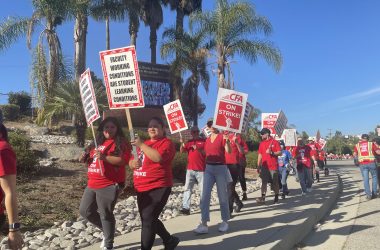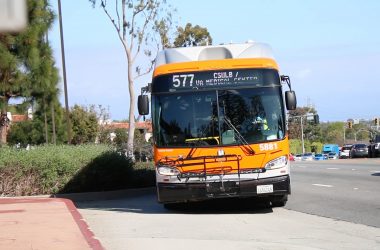Click here to read about other LGBT Diversity Week events
LGBT Diversity Week opened on Monday with a topic that had been the subject of many heated discussions in last November’s elections: Proposition 8.
While the presentation was called “Prop 8 and Single Issue Politics Panel Presentation: LGBT Professors Discuss Intersections of Sexual Orientation, Race and Religion,” the four panelists, three of which are Cal State Long Beach faculty members discussed topics such as “within and between group marginalization,” dominance and the meaning of “whiteness.”
Close to 100 students and faculty members attended the discussion, which was followed by a brief Q-and-A session followed the presentation.
Thomas Alex Washington, associate professor in the College of Health and Human Services, focused on what he called “within and between group marginalization,” which he defined as racism, oppression and discrimination within the LGBT community.
Washington also discussed the importance of faith and, more precisely, the “black religious experience as a source of compassion and strength for many African-Americans” and as a “mixed blessing for black lesbians and gays.”
Washington said, “We still find congregations and homosexuals themselves participating in the elaborate conspiracy of silence and denial.”
Washington’s heartfelt message was that “whether combating homophobia that is du jour, de facto, institutionalized, religious-based or just simply mean-spirited, we must stay vigilant and ever so present in the struggle for equal civil rights for GLBT persons.”
Echoing Martin Luther King Jr.’s inspirational message, Washington ended his presentation referencing the famous “I Have a Dream” speech, only his dream is that one day in his lifetime a man will be able to legally marry his male partner and a female will be able to marry her female partner.
Elizabeth Philipose, associate professor in women’s studies, discussed the issue of “whiteness” and defined it as referring to those who are “properly heterosexual, Christian, male, adult, propertied and of European descent.
“Whiteness” is a shared assumption by our society, Philipose said, adding that our society is not only “structurally racist” but also “structurally sexist.”
“In every single institution is embedded the idea that heterosexuality is normal, healthy, appropriate, necessary and a superior way of being,” Philipose said.
Considering the fact that the marker of “whiteness” is one that excludes and marginalizes many people, the task goes beyond individual morality to become an analytical task and an understanding of how power operates in our world, Philipose said.
She said the Proposition 8 debate gives us the opportunity to understand the mechanism of racism and homophobia and in doing so we can raise awareness and promote social transformation.
Eric Wat, former faculty member in Asian and Asian-American studies, made a parallel between the Civil Rights movement and the events that are taking place regarding the issue of same-sex marriage.
“I just don’t think we did it with the right strategy,” he said.
But Wat remained positive, saying that he believed same-sex marriage will be possible in his lifetime.
The problem isn’t same-sex marriage, but the way it has been framed. Many of its proponents pitch marriage as the solution to all problems, Wat explained.
Wat said the LGBT community needs to do more community education and more organizing in order to change people’s minds.
Lauren Rauscher, assistant professor and adviser in the human development department, was the final panelist.
She approached the matter as an “out” faculty member and described her position as a privileged one.
Growing up in Memphis, Tenn., she was raised toward thinking that being white, heterosexual and middle-class is right. Growing up, going to college and getting married was the norm, Rauscher explained.
As a feminist in training, Rauscher said she “learned to develop tits of steel.”
Her experience as a white and out faculty member has afforded her positive experiences, which has allowed her to discuss LGBT issues in class without backlash.
Rauscher feels she needs to use her privileged position as a white woman in the LGBT community, to listen a lot more and to build coalitions across different racial and ethnic groups for positive social change.
The Q-and-A that followed the discussion was short and touched on questions relating to concerns on how to approach the faith-based community. Washington said that dialogue should be initiated with the faith-based community and that the goal is to learn from one another, to discuss and to hear each other.
While the discussion was informative and interesting, most of those who participated in the Q-and-A were faculty members, and students involved seemed uninvolved and disinterested.
One audience member said he was not homophobic even though he voted “yes” on 8. Proposition 8 is not simply about marriage, it entails much more, he explained.
Another audience member thought that acts of anger following the passage of Proposition 8 were due to feelings of wrongfulness, which Wat explained as normal expressions of anger coming from a minority and marginalized group.




As a former professor of Social Work at several major U.S. campuses, and as a very engaged community activists for all oppressed and institutionalized groups, I am heartened by the panel discussed here, and praise the Gsy/Lesbian Student and Faculty on Cal. State – Long Beach Campus for continuing to openly discuss not only the problems of discrimination, but openly formulate solutions. As Dr. Washington stated, it is very disappointing to discover that we can still find Black churches that are incubators for continued discrimination, oppression, ignorance and harmful expressions of rejection towards Gay and Lesbian people…including members of the congregations who are Gay or Lesbian. The internalized negative beliefs and feelings about being Gay or Lesbian forces many people to be the leaders of oppressive movements. But the enlightened few, such as those who served on the panel at Cal. State – Long Beach…are leading the way towards a more open and inclusive society. Bravo. I share your Dream Dr. Washington. Dr. June P. Murray, semi-retired, but not inactive!